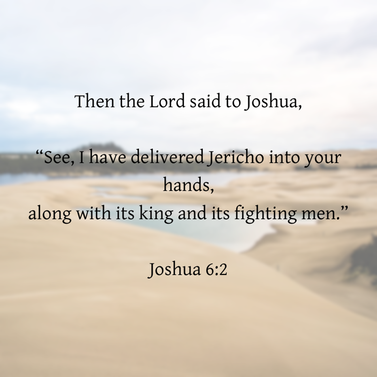|
Good morning!
We're so glad that you've joined us today!
When we met in person, we shared our joys and concerns together. The last time our Sunday school class met together in person was March 15, 2020, almost exactly one year ago. Take some time to think over your past week, and consider what joys and concerns you have. Then, consider the past year, and any worries or feelings of thankfulness that brings as well. If you would like, you can share your thoughts as a comment to this post. When you feel ready, use the prayer below:
Loving God, giver of all light and life,
You sent Jesus Christ into the world not to condemn, but to save. Help us to lift up the light of Christ so that the world might believe in him and receive the gift of eternal life. [pray for your requests and the requests of others here] Through Christ, the light of the world we pray. Amen.
This week's lesson is one Joshua 5:13-15 and Joshua 6:1-5, 15-16, 20.
Lesson Context When we think of the book of Joshua, we consider it to be the first of the books of history (Joshua through Esther). However, to Jewish readers of the Old Testament, the book of Joshua is one of the Former Prophets (along with Judges, Samuel, and Kings). These prophets are those from Joshua's leadership after the death of Moses until the exile in Babylon. The Latter Prophets, those after the exile, include Isaiah, Jeremiah, Ezekiel, and the twelve minor prophets. The book of Joshua in the Old Testament begins with the Lord's exhortations to Joshua following Moses' death. Joshua was to lead the people across the Jordan River into the promised land (Joshua 1:1-9). This is the beginning of conquering the promised land from the people living there. Usually, we don't think of Joshua as a prophet. Our Sunday school book argues that he was. Joshua was the successor of the prophet Moses (Deuteronomy 18:15). God spoke to Joshua to give directions to Israel, which is a characteristic of a prophet (Hebrews 1:1). Joshua then challenged the people to get rid of their idols and commit themselves fully to the Lord, a common task for prophets (Joshua 23:1-24:28). Our book also throws out an interesting parallel between the Old and New Testaments. Joshua may be considered a prophetic forerunner of Jesus. Both names mean, "the Lord is salvation." As Joshua led the ancient Israelites into the promised land of Canaan, Jesus leads generations of God's faithful people into the promised land of heaven. Lesson Today's lesson is a fairly familiar story for most of us. After wandering in the desert, the Israelites cross the Jordan River into the promised land. All they must do is conquer the people already living there. First up, the city of Jericho. Spies, with the help of Rahab, have already checked on the city. An armed man appears to Joshua, and says that he is, "the commander of the army of the Lord." This makes sense. The man, possibly an angel, will lead the Lord's army in conquering the promised land. But, importantly, the man never says he is with the Israelites. Whether he was for or against he Israelites depended upon their faithfulness and obedience to the Lord. Joshua then wants to know what the Lord's message is from the man. After all, Jericho is a walled, fortified city. No one has been allowed in or out. The next chunk of scripture says that the Lord tells Joshua what will happen. It is not clear whether the armed man was, in fact, the Lord, or whether he was preparing Joshua to meet the Lord. The Lord said to Joshua, "See, I have delivered Jericho into your hands, along with its king and its fighting men." Read that statement again. The Lord has already delivered the city to Joshua. It will be a decisive victory. Then, the Lord gives more explicit instructions: "March around the city once with all the armed men. Do this for six days. Have seven priests carry trumpets of rams' horns in front of the ark. On the seventh day, march around the city seven times, with the priests blowing on the trumpets. When you hear them sound a long blast on the trumpets, have the whole army give a loud shout; then the wall of the city will collapse and the army will go up, everyone straight in." Does this sound like any military campaign that you've ever heard of? Probably not. But Joshua and the Israelites follow the Lord's directions. On the last day, Joshua tells army, "Shout! For the Lord has given you the city!" The walls haven't yet fallen. Again, even though it hasn't happened, we see that the Lord has already delivered the city to Joshua and the Israelites. There is a lot of faith in that statement! After the shout, the walls collapse. The army charged in, and took the city. The big key here is that the army followed every command the Lord had given to Joshua. As we move forward, this will also be the key to the Israelites conquering and keeping the promised land.
Conclusion
Consider the faith required to trust and obey God's directions for conquering the city of Jericho. What kind of a battle plan is walking in circles around the city? Who conquers a city doing that? The answer: God does, and his people do so by faith in him. The big idea here is that the Israelites could only receive the promised land on God's terms. The people were not to compromise, ignore, or tweak the terms in any way. Even though the commands of God were unconventional, those commands were to be obeyed. What does this mean for us? We need to remember that God's commands are still meant to be obeyed. We might disagree about some particulars, but the big commands stand. Love the Lord (Mark 12:30), which involves obedience (John 14:15). May we obey everything the Lord has revealed to us that we may receive his blessings! Prayer Father, thank you for leading us with your Word and your Spirit. May they strengthen our obedience to you! In Jesus' name we pray. Amen.
Benediction
This week's benediction is from the New International Version.
Next week's lesson will be on 2 Kings 22:14-20.
1 Comment
3/14/2021 04:45:14 pm
I remember as a child learning the song”Joshua Fought the Battle of Jericho “. We definitely have to trust in God like Joshua did when Jericho was a fortress that seemed impossible to defeat
Reply
Leave a Reply. |
AuthorWe are a small, rural Presbyterian church in southwestern Pennsylvania. Archives
July 2024
Categories
All
|



 RSS Feed
RSS Feed